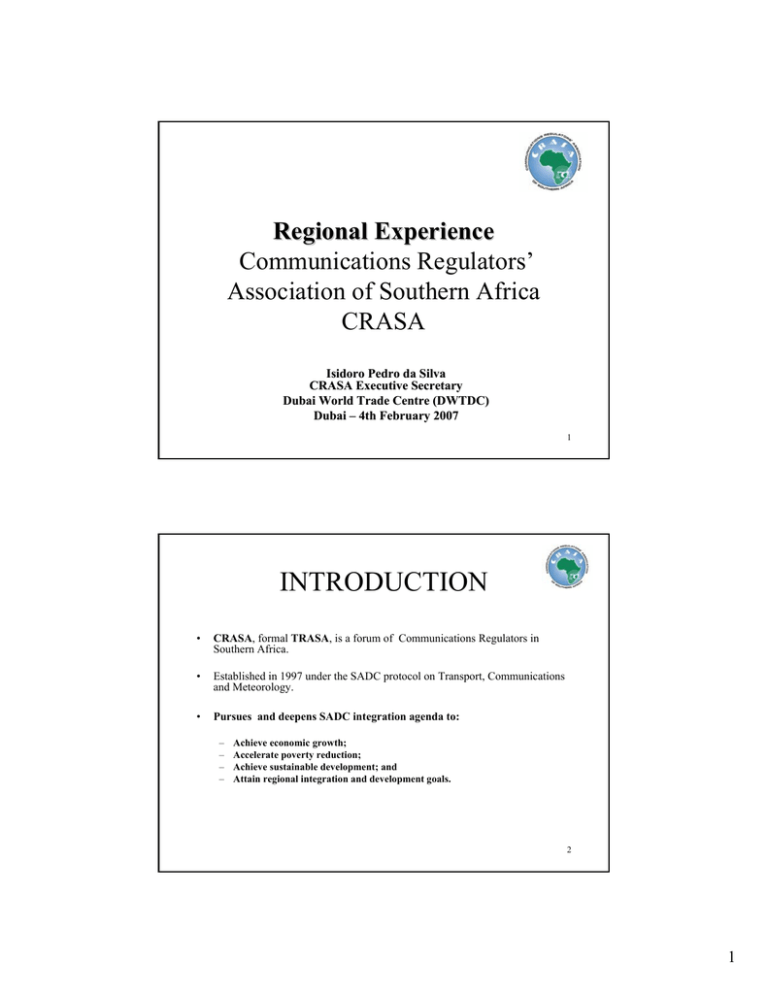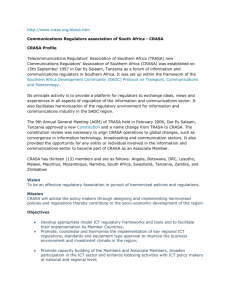INTRODUCTION Regional Experience Communications Regulators’ Association of Southern Africa
advertisement

Regional Experience Communications Regulators’ Association of Southern Africa CRASA Isidoro Pedro da Silva CRASA Executive Secretary Dubai World Trade Centre (DWTDC) Dubai – 4th February 2007 1 INTRODUCTION • CRASA, formal TRASA, is a forum of Communications Regulators in Southern Africa. • Established in 1997 under the SADC protocol on Transport, Communications and Meteorology. • Pursues and deepens SADC integration agenda to: – – – – Achieve economic growth; Accelerate poverty reduction; Achieve sustainable development; and Attain regional integration and development goals. 2 1 INTRODUCTION (cont) • At 9th CRASA AGM , held on 23rd – 24th February 2006, in Dar- es –Salaam - Tanzania, the Association adopted a new Constitution and a change of the name from TRASA to CRASA. • Impact of the new constitution: constitution: – Removal of bias from telecommunications to ICT. – Wideness and refocuses to deal with the convergence of telecommunications, media, and information services. • Telecommunications, Broadcasting and Postal – Alignment with the dynamic development pace of the Sector. – Accommodate technology and services convergence. – Establish a broad line of communication on the ICT sector allowing Members and Associates to interact. • Opportunity for all stakeholders on ICT Sector to be part of the Association (Telecomm Operators, broadcast operators, ISP’s, Regulators, Individuals…). 3 Conducive Regulatory Environment • Implementation of environment for: regulatory on conducive – Promotion of investment, – Development of infrastructure and services. – Promotion of quality of service and services accessibility – Service Affordability 4 2 CRASA STRUCTURE • Highest decision making organ – AGM. • Executive Committee – Consists of a Chairperson and 3 Members States i.e. 2 Vice Chairpersons & Treasurer. • Specialized Committees - Specific functional committees to develop guidelines and model regulations. • Secretariat 9 Headed by an Executive Secretary and has the headquarter in Gaborone, Botswana. 9 Carries out the administrative and project management duties of CRASA 5 CRASA Organization Chart Annual General Meeting AGM Executive Committee Specialised Committees Secretariat 6 3 CRASA Specialised Working Committees • Universal Services/Access and Licensing. • Tariffs and Interconnection including Competition. • Radio Frequency Planning, Technology and Advanced Services. • Numbering and Standards. • Human Resources Development and Empowerment. • Consumer Issues. • Finance and Audit. • Legal • Revenue Generation Project Task Teams • Review strategic Business Plan. • Legislative Review • Special committee for Regulatory implications of the EASSy Project. • Recommendations on ATRN Issues 7 Immediate Actions for the new formed Task Teams The New Task Teams were formed to address urgent matters such as: as: • Review Strategic Business Plan. • Review of the Vision, Mission and Objectives of the Association. • Preparation of CRASA’s Business Plan. • Legislative Review. • Analyze the Legislative Changes/Trends in the Region and its respective implications. • Advice on Regulatory Implications of E-Nepad Africa Broadband ICT Infrastructure. • Prepare a expeditiously a paper on regulatory implications of the Project to the Region and, • Advice Members accordingly. • ATRN • Prepare a recommendations on ATRN CRASA positioning for the formation of Association of ICT African Regulators. 8 4 Major Achievements • Adopted Action Programme in April 1999. • Adopted 5-year Strategic Business Plan in September 2000 • New Strategic Business Plan 2007 – 2012 will be approved soon. • Adopted and published model guidelines and regulation on interconnection, tariffs and a SADC Regional Frequency Band Plan. • Launched the Network for Capacity Building and Knowledge Exchange in the field of Policy and Regulation. • The number of autonomous regulators increased from 9 in April 1999 to 13 to date. • Development of SADC telecommunications policies. 9 Major Achievements (cont) • Completion of a series of study papers and guidelines e.g: 9 interconnection & tariffs 9 Universal service & licensing 9 SADC Frequency / Band Plan 9 Fair competition and wholesale Pricing. • Published Five Annual Report, from 2001 to 2005. • Annual Report 2006 to be published soon. 10 5 Major Achievements (cont) • By conducting workshops and meetings, it has assisted members in the sharing of experiences and enhancing the capacity of members. • Lobbying SADC Member States and other stakeholders on implementation of regional model policies and provision of support to CRASA and its members; and • Coordination of members’ views and positions in regional & international meetings. 11 Challenges • Lack of enforcement mechanism because of the sovereignty of each regulator. • Establishment of professional development programme and skills on on the region to deal with the regulation of converged services i.e telecommunications telecommunications and broadcasting. • Improvement of negotiation and mediation skills. • Dispute resolution (Industry and Policymakers). • Establishment of an permanent line of communication between various various bodies (stakeholders) . • Promotion of the provision of universal access/ services. • Limited purchasing powers of consumers in the region. • Lack of sufficient funding to support staffing level of the association. association. • SelfSelf-Sustainability. 12 6 Future Plans • Finalisation and launch of CRASA Strategic Plan 2007-2012. • Modification and/or development of new regulations both in telecommunication sector, broadcast, media laws and competition laws. • Development of interventions that will ensure sustainable dissemination and widespread use of ICTs. • Development of guidelines for ICT through Wireless Broadband Technology. • Development of regulatory/guidelines/policies for implementation of new services. 13 Future Plans (Cont) • Access to FDIs to finance network expansion. • Implementation and monitoring of policies and regulation at regional level by respective countries. • Consolidation and strengthening of regional blocks to feed to continental ideals on the ICT Sector. 14 7 Conclusion • CRASA should be seen as: – Catalyst for ICT development in the SADC region. – Provider of sound and harmonised model policy guidelines and regulations to foster sustainable economic development in the ICT sector. – Voice of Members and Associates to develop and promote the region. 15 INVITATION You are kindly invited to participate at CRASA 10th AGM that will take place in Windhoek, Namibia, from 12 – 16 March, 2007 16 8 CRASA SECRETARIAT Millennium Office Park, Plot 122 Unit Number 1G - Ground Floor, Private Bag 00351, Suit #235 Kgale View Gaborone. Botswana E-mail: crasa@it. bw crasa@it.bw Website: www.crasa .org. www.crasa.org. Phone: +267 3158468 Fax: +267 3181171 17 9


